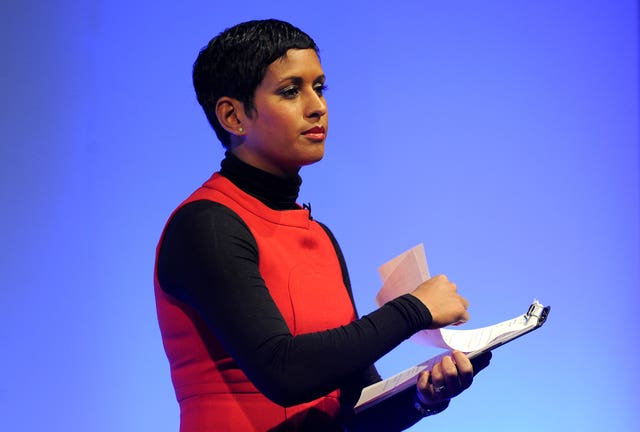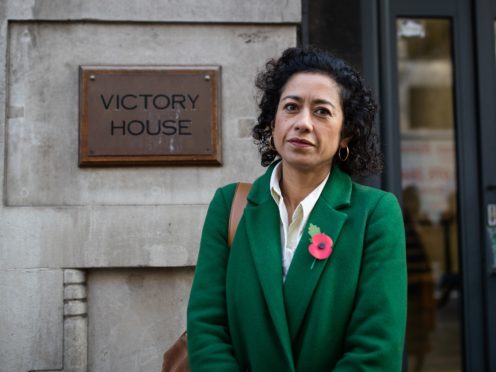A senior BBC executive has argued the broadcaster was justified in paying presenter Samira Ahmed less than Jeremy Vine due to differences in news and entertainment shows.
Newswatch presenter Ahmed has brought the corporation to an employment tribunal this week and claims she was paid a sixth of what Vine received for hosting the similar show Points Of View.
Ahmed is seeking nearly £700,000 in back pay and said that she and Vine did similar work, while the BBC rejects the claim and says the work is not comparable.
At the Central London Employment Tribunal hearing on Friday, the BBC’s director of strategy Gautam Rangarajan said there were key differences in the roles and reach of the two presenters.
He focused on the difference between news and entertainment programmes made by the BBC, which affects the way the programmes are made and produced.

Mr Rangarajan said: “Newswatch is a news programme. It is made therefore by the BBC’s in-house news department.
“Points Of View is a non-news entertainment programme which ranges across every TV genre that the BBC makes.
“There is a clear distinction between the two shows, and their genres, which is reflected in their broadcasting slot and their audience.”
Mr Rangarajan said one key difference between news and non-news shows was presenter appeal.
He told the panel that the personalities of the presenters did not greatly affect the appeal of news programmes such as Newswatch, but had a role in non-news programmes including Points Of View.
“When people turn onto the news, they turn on to see the news that day,” he said.
“However, if you have a different presenter for a non-news show, the audience will go up or down and the appreciation they have can be seen.”
Mr Rangarajan, who has been director of strategy for the broadcaster since 2013, said Ahmed and Vine “perform very different roles” in the corporation.
“Newswatch requires a trained, experienced journalist able to ask difficult questions of senior executives where necessary,” he said.
He added: “The public profile of presenters is significant in a non-news context and is more important than in news.
“Profile is one of the various individual factors in news presenter pay, but it is not dominant.
“The most high-profile presenters can become channel-defining for broadcasters.”
He went on to say that Newswatch is less newsworthy than other news and factual programming by the BBC, measured by how often the shows were mentioned in the press.
Mr Rangarajan added: “The Today programme has around 100,000, BBC Breakfast has around 1,200 and Newswatch has 43.”
He later referenced the average audience figures of 2018, with 106,000 adults watching per week for Newswatch and 864,000 per week for Points Of View.
Showing the tribunal panel a graph of viewing figures by time, the tribunal heard there were “dips” in viewing including shortly after Newswatch began.
“The dip happens one or two minutes or so in the case of Newswatch. The programme begins at 7:47 and the dip occurs at 7:48,” Mr Rangarajan said.
The pay for on-air roles is determined by the long-term effect they have on the BBC’s audience and its core editorial impact, known as Band F positions.
Mr Rangarajan said Newswatch and Ahmed did not meet the Band F criteria, and was instead at the top of Band E when assessed.
Rachel Crasnow, QC, representing the BBC, previously said Newswatch was broadcast on the “relatively niche” BBC News channel.
However Claire Darwin, representing Ahmed, highlighted the wider reach of Newswatch and the BBC News channel.
She said: “The news channel reaches about 13% of the UK population for at least three minutes a week, so about eight or nine million people. So it’s not really that niche.”
She also added that the average audience figure has remained stable over the past seven years, despite general television viewing figures falling among all broadcasters.
“If your audience figures for a programme stay the same from 2012 to 2019, you’re doing quite well,” Ms Darwin added.

Naga Munchetty, Louise Minchin and Sarah Montague were previously named as staff who tried to lodge a collective equal pay claim against the BBC, according to tribunal documents.
A letter from the National Union of Journalists (NUJ) to the corporation in December 2017 was included in evidence submitted to Ahmed’s employment tribunal.
The NUJ raised a collective grievance against the broadcaster on behalf of 121 members who approached the union, with the list of complainants including that they believed they had received less pay than men doing the same or equivalent work between December 2011 and December 2017.
In her written evidence to the tribunal, general secretary Michelle Stanistreet said the complaints featured women from across the BBC.
Munchetty, who joined Ahmed at the first day of her tribunal as a supporter, Minchin and Montague were some of the most familiar faces on the list, alongside presenter Joanna Gosling and reporter Orla Guerin.
The tribunal continues.
